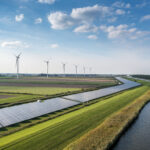BiU today announces a major repositioning to Sustainable Energy First, reflecting the company’s renewed focus on supporting UK business to achieve a positive climate impact, whilst providing financial stability.
The bold move signifies a commitment to steps far beyond a typical repositioning: Sustainable Energy First is repurposing its business. It will now apply all its talent and technology towards improving UK business’ sustainability performance in three specific areas: economic, environmental and social.
Purpose-led
As a leading energy and utility management consultancy, the company will continue to deliver its core services which include procurement, revenue recovery, compliance support and net zero consultancy. However, as Sustainable Energy First, it pledges to place economic and environmental sustainability at the heart of its purpose.
Central to this ethos is a “service agnostic” approach. Whatever it is contracted to deliver, the Sustainable Energy First team will be hunting for tangible opportunities to improve customers’ sustainability impact and financial viability.
Using a combination of people and technology, the team will identify and provide a business case for a range of decarbonisation measures, from remote energy management through to large-scale renewable energy projects.
Shared goal for greater impact
Sustainable Energy First’s approach is different to anyone else in the traditional ‘TPI’ (Third Party Intermediary) market: it wants to share in the decarbonisation targets of its customers.
The company estimates that its current customer base comprises 3.3% of the total UK business CO2e footprint. Recognising its potential for positive impact, the company – which achieved an Investors in People Silver accreditation in 2021 – wants each of its 126 colleagues to be sustainability changemakers. Staff will be encouraged to use their vast collective experience to help customers slash this 3.3% figure.
Data has always been the cornerstone of what Sustainable Energy First delivers, and it will remain a major focus area for the future. The company will invest in more resources and people to collect, validate and interpret as much customer data as possible. This data-led approach will unveil even more opportunities to save organisations carbon and costs.
Michael Abbott, Chief Executive Officer at Sustainable Energy First, said:
“We’re really excited to be repositioning as Sustainable Energy First: it marks a brand-new chapter in our 25-year evolution. Sustainability is driving every corporate and social agenda, but this was not a ‘fashion-led’ decision – it’s about embedding sustainability into everything that we do, and empowering our staff to deliver positive change.
“Rather than being all things to all people, we are focusing on the one (important) piece of the ESG puzzle that we do well – that’s helping companies to decarbonise as rapidly as possible and improve their economic sustainability and resilience to uncertainty. We are already helping many existing and new customers navigate the challenging conditions of the energy market crisis, to mitigate the impact on their business and ensure long-term survival.
“Collectively our clients account for a significant proportion of the UK’s carbon emissions – we want to take responsibility for driving down this number as swiftly as possible to get the UK to net zero.”
Our ecosystem
Our sustainability ecosystem puts our clients, people and technology at the heart of every project we do – from enriching data that uncovers decarbonisation projects to securing renewable energy for financial forecasting stability. Our goal is to make your business sustainable – economically and environmentally.
Leading by example
The company is also addressing its own environmental impact. Sustainable Energy First will set a science-based emissions reduction target this year, in line with the Science Based Targets initiative (SBTi). It will also set a net zero target this year, with a clear pathway on how this will be achieved and by what date (before the UK’s 2050 target). It will report voluntarily on progress in its annual sustainability report.
The company is also aiming to be carbon neutral in 2022, by purchasing high-quality offsets to cover its current emissions while it transitions to net zero. Other internal initiatives include a transition to clean energy. The company has electrified its own office’s energy usage for heating and cooling; with zero natural gas used on site. It has also made a significant investment in virtualising its IT infrastructure which has drastically reduced its largest single consumer of power.
The company purchases green only electricity, and to gain greater additionality it is exploring options for onsite solar generation and battery storage.
Sustainable Energy First has introduced initiatives to help staff reduce their own carbon footprints, including a salary sacrifice electric vehicle scheme. The company continues to explore training, tools and incentives to support leadership on an individual basis.
Anthony Mayall, Chief Commercial Officer at BiU said:
“The leadership team has set itself one overriding goal – to make this transition authentic in every way possible. We will be judged by our team and our customers on this basis. The measure of authenticity will be one transparent truth and that is the actual decarbonisation affected by the business.”
History
BiU was founded in 1997, to solve energy management problems in very large, complex commercial estates. The company has been people-focused from the beginning and set out to challenge statistics that show only a small minority of the global workforce are engaged at work.
This purpose has supported BiU in its growth to 126 staff, serving the UK’s largest enterprises across a diverse range of sectors. The company achieved an Investors In People Silver accreditation in 2021 and was also ranked within the top 100 Best Mid-Sized Companies to Work for.
In recent years, as businesses have become more aware of the urgent need to act on climate, BiU has adapted its delivery model to help customers (and themselves) move swiftly to decarbonise.
Over the last five years, the company has invested significantly in building a credible delivery capability in sustainability services including a net zero carbon framework, trading renewable gas and power, peer to peer renewable energy, delivery of corporate power purchase agreements and a “deep green” power consortium.
Taking a gear-change in its approach, the company now wants sustainability to be central to everything that it does. The rebrand and refocus to Sustainable Energy First marks this pivot toward being truly driven by sustainable outcomes.







